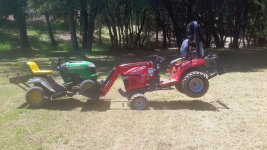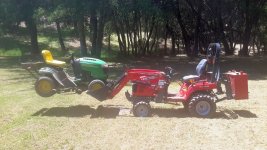Using the backhoe outriggers can help to keep you from going all the way over. Obviously you won't be able to move with them all the way down and if you "hover" them a few inches off the ground, you run the risk of bending them if you hit a bump or hole. As has been pointed out, if you get to the point where you're using your outriggers that way, or swinging the backhoe around for counterweight, you've overloaded your machine. You can decide what to do from there. I've overloaded plenty of loaders of varying kinds and made it work, but that doesn't mean it's a good idea, especially for someone who doesn't understand the forces that are being exerted and where.I have a sub-compact, emax 20s with a bucket and backhoe. A couple of times with a heavy load on the front (clamp on forks) I've felt a rear wheel lift off the ground. Lowered the bucket, inched forward, and lowered the backhoe outriggers to help keep from tipping. Is that a stupid think to do? Does it help?
You are using an out of date browser. It may not display this or other websites correctly.
You should upgrade or use an alternative browser.
You should upgrade or use an alternative browser.
tractor tipping question
- Thread starter EdwardL
- Start date
/ tractor tipping question
#31
Too many Kubotas
Platinum Member
Sorry, but I don't see how having limited articulation would make it easier to overload anything up front. To me, adding weight to the rear does.The blocks decrease the distance that the front axle can pivot, which allows him to more easily overload the front axle, loader, tires, wheels etc. with less risk of tipping. It significantly increases the chances of breaking something, since the "clue" of the rear getting light and the tractor pivoting on the front axle is less noticeable.
Also, it's very easy to tell when the rear is getting light (well. for me it is) regardless of articulation abilities. I've lifted both rears evenly a few times when underestimating the weight on the pallet forks, and with unaltered pivot travel in the front.
WranglerX
Elite Member
Too many Kubotas
Platinum Member
More that I don't understand. I use the backhoe as a counterweight with no loads whatsoever, either on side hills or when crossing ditches. Certainly shouldn't be an overload situation.As has been pointed out, if you get to the point where you're using your outriggers that way, or swinging the backhoe around for counterweight, you've overloaded your machine.
I though I knew the forces involved, after all it's simple physics, but I guess I have a lot to learn yet.but that doesn't mean it's a good idea, especially for someone who doesn't understand the forces that are being exerted and where.
It makes it easier to overload without pivoting as much. If you're on perfectly flat ground, with tires that are at exactly the same pressure, lifting a load that is perfectly centered and the rear of the tractor has the center of gravity exactly balanced between the wheels and the operator stays exactly in the center and doesn't lean one way or the other, at all, then the rear wheels will lift evenly and stay that way. Otherwise, they may lift at the same time, but as soon as there is the slightest shift in anything being exactly balanced in the middle, the tractor will pivot on the front axle. Adding weight to the rear will also allow more overloading, since it makes the machine more stable and less prone to the rear end lifting.Sorry, but I don't see how having limited articulation would make it easier to overload anything up front. To me, adding weight to the rear does.
Also, it's very easy to tell when the rear is getting light (well. for me it is) regardless of articulation abilities. I've lifted both rears evenly a few times when underestimating the weight on the pallet forks, and with unaltered pivot travel in the front.
I didn't say that using the backhoe as a counterweight caused overloading, I said it made it easier to overload. Anything that makes a machine harder to tip makes it easier to overload it, obviously.More that I don't understand. I use the backhoe as a counterweight with no loads whatsoever, either on side hills or when crossing ditches. Certainly shouldn't be an overload situation.
I have no idea what you do or don't know.I though I knew the forces involved, after all it's simple physics, but I guess I have a lot to learn yet.
Too many Kubotas
Platinum Member
As in the photo in post number 33?If you're on perfectly flat ground, with tires that are at exactly the same pressure, lifting a load that is perfectly centered and the rear of the tractor has the center of gravity exactly balanced between the wheels and the operator stays exactly in the center and doesn't lean one way or the other, at all, then the rear wheels will lift evenly and stay that way.
I think it's highly unlikely that WranglerX got off of the tractor, and back on, while staying exactly in the center.
It really is a matter of understanding the "forces that are being exerted and where".
lilranch2001
Super Member
- Joined
- Nov 25, 2009
- Messages
- 8,400
- Tractor
- Bobcat CT 235
May I say that as far as I’m concerned, this topic is a strange topic……
I'm not sure if you're disagreeing with me or what? If all the tractor's weight is on the front axle and the weight is not perfectly centered, it will tilt towards the heavier or downhill side. That isn't my opinion, that's a fact.As in the photo in post number 33?
I think it's highly unlikely that WranglerX got off of the tractor, and back on, while staying exactly in the center.
It really is a matter of understanding the "forces that are being exerted and where".
lilranch2001
Super Member
- Joined
- Nov 25, 2009
- Messages
- 8,400
- Tractor
- Bobcat CT 235
I think I’ve tried to think too hard on this thread, I’m gonna go take a nap

